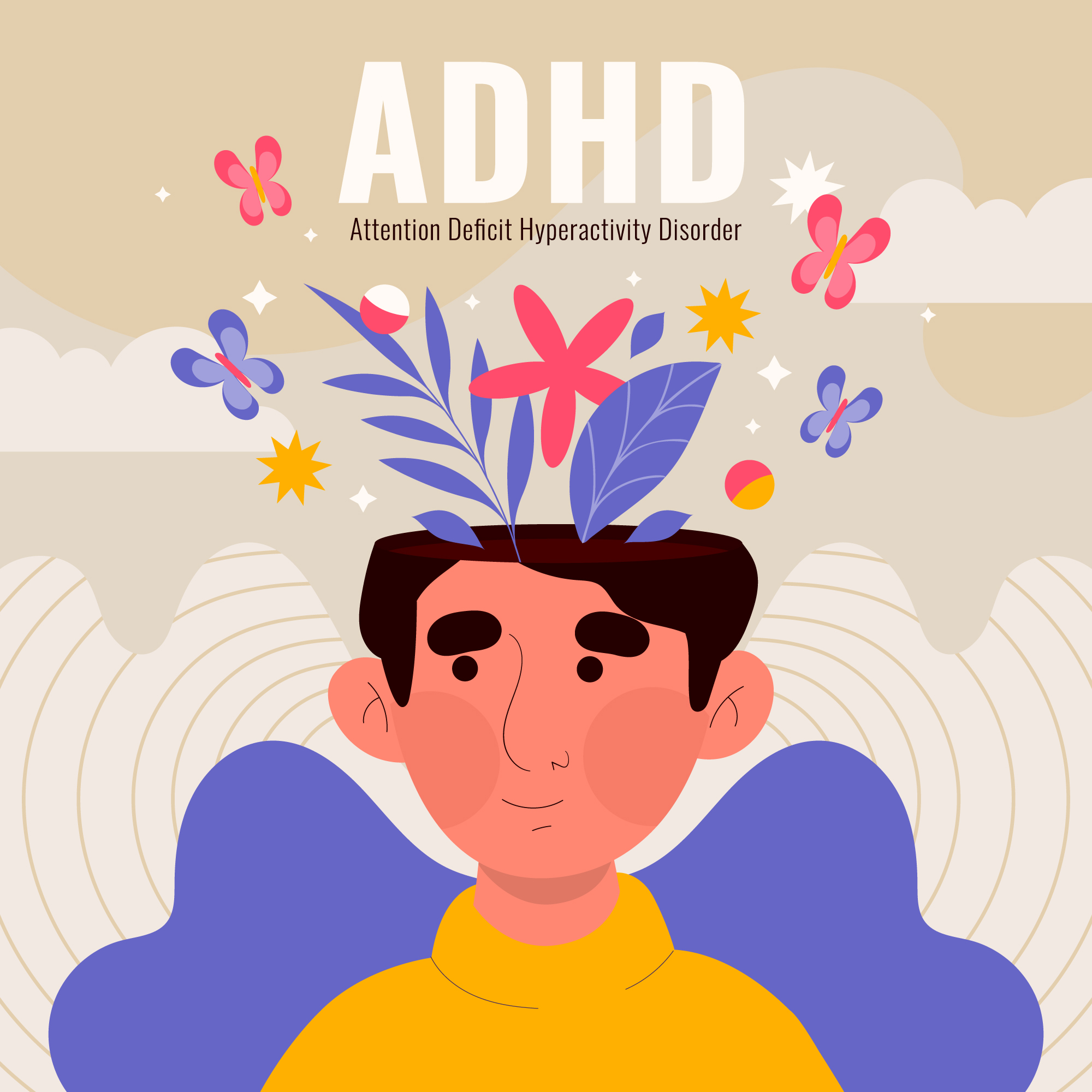Attention Deficit/Hyperactivity Disorder (ADHD) is a neurodevelopmental condition affecting millions of people worldwide, particularly children, though adult versions are becoming more prevalent and significantly impact daily functioning. This article offers an in-depth explanation of ADHD diagnosis including criteria used, the process involved and importance of early detection.
What Is ADHD (Attention Deficit Hyperactivity Disorder) ADHD is a complex neurological condition characterized by inattention, hyperactivity and impulsivity which interfere with everyday activities for those affected. These symptoms often first manifest themselves during childhood years but may persist into adulthood as well.
There are three main categories of ADHD.
Attentive Type (ADHD-I): Characterized by inattention without significant hyperactivity or impulsivity, Hyperactive-Impulsive Type (ADHD-HI): Predominantly marked by hyperactivity and impulsivity without significant inattention.
Combined Type (ADHD-C): This type is the most prevalent and involves both inattention and hyperactivity-impulsivity symptoms. ADHD Diagnosis Criteria
Di- gnozing ADHD can be a complex process involving several steps, starting with clinical assessment: This typically entails having a healthcare provider, such as a pediatrician, psychiatrist or psychologist conduct a full examination that includes gathering information about developmental history, family background and current behavior of an individual.
Diagnostic Criteria for ADHD: To be diagnosed with ADHD, an individual must meet specific criteria outlined by the Diagnostic and Statistical Manual of Mental Disorders 5th Edition (DSM-5), which is the industry-standard classification system used by healthcare providers to classify mental illnesses.
- Inattention symptoms: This includes being easily distracted, forgetful and struggling to sustain attention on tasks. B. Hyperactivity/Impulsivity symptoms: These could include restlessness, fidgeting, making decisions without prior thought and difficulty waiting their turn.
Rule Out Other Conditions: It is crucial to rule out other medical or psychological conditions that might resemble ADHD symptoms, such as anxiety, depression or learning disabilities. Assessments and Tools can help pinpoint these possibilities.
Attribute Rating Scales are used to assist in diagnosing ADHD:
these questionnaires can be completed by parents, teachers and even the individual themselves to gain insight into behavior patterns across settings.
Continuous Performance Tests (CPTs): These computerized assessments measure an individual’s sustained attention and impulsivity. Neuropsychological Testing: This involves administering numerous cognitive functions assessments such as memory, attention and executive functioning. Importance of Early Detection
Early identification and diagnosis of ADHD is important for several reasons, including intervention and support; with early identification individuals can access appropriate interventions such as behavioral therapy, educational accommodations or even medications to treat their ADHD.
Enhance Academic and Occupational Performance: Utilizing effective management strategies can significantly enhance academic and occupational outcomes for individuals with ADHD.
Enhance Quality of Life: Understanding and managing ADHD can lead to enhanced relationships, self-esteem, and overall well being for those affected. Challenges In Diagnosing ADHD
Early diagnosis is crucial, yet diagnosing ADHD presents distinct difficulties:
Overdiagnosis and Misdiagnosis: Overdiagnosis occurs when normal variations of behavior are taken as signs of ADHD; conversely, some individuals living with ADHD go undiagnosed or misdiagnosed with other conditions.
Stigma and Stereotypes: Unfortunately, ADHD has the unfortunate reputation of being associated with social stigma that may deter some from seeking diagnosis or treatment for themselves or their child.
ADHD Diagnosis in Children vs Adults
ADHD can manifest itself differently between children and adults, making recognizing any discrepancies between their symptoms essential for accurate diagnosis and successful intervention.
Children: For children, ADHD symptoms often become most noticeable at school. Teachers may note inattentiveness, fidgeting and difficulty following instructions as symptoms.
Social Interactions: Children with ADHD often struggle with social interactions, including taking turns and maintaining friendships.
Parental Input: Parental input can provide an accurate view of a child’s behavior across settings.
Adults:
Workplace Challenges: Its For adults living with ADHD symptoms, ADHD symptoms can have serious ramifications on professional life. Difficulties with organization, time management and focus may create issues in the workplace that make life a daily struggle.
Relationship Strain: ADHD can wreak havoc with personal relationships. Impulsivity and forgetfulness may result in miscommunication or conflicts that lead to misunderstandings or conflicts.
Coping Mechanisms: Adults living with ADHD have often developed effective coping strategies over time that may reduce some symptoms.
Co-Occurring Conditions and Differential Diagnosis
ADHD frequently co-occurs with other conditions, making diagnosis more complex. Common co-occurring conditions include anxiety disorders (which include restlessness and excessive worrying) which often overlap with ADHD symptoms.
Depressive Disorders: Low energy, poor concentration and irritability may be signs of both ADHD and depression. mes Learning Disabilities: Difficulties with reading, writing or mathematics could indicate learning disability rather than ADHD alone.
Differential diagnosis conducted by qualified healthcare providers helps distinguish among these conditions and make an accurate diagnosis. After receiving an ADHD diagnosis, there are various treatment options to explore;
Behavioral Interventions: For children, such interventions might include parent training and behavioral therapy sessions, while classroom accommodations and classroom accommodations could benefit greatly from classroom accommodations and time management and organization strategies for adults.
Medication: Stimulant and non-stimulant medications may be prescribed to manage ADHD symptoms. Their dosage will depend on individual response; accordingly, these should be carefully adjusted according to individual responses.
Psychoeducation: Giving individuals and their families information about ADHD, including ways of controlling symptoms, can be extremely useful.
Support Systems People living with ADHD require support from family, friends and educational/work environments in order to effectively manage their condition. Empathy from caregivers and supervisors can go far towards helping individuals effectively manage their condition.
Navigating Life with ADHD
Accurate diagnosis is the foundation of effective management for individuals living with ADHD. By understanding their diagnostic process, co-occurring conditions, treatments available and any necessary support systems and interventions available they can navigate life with greater confidence and success – as can anyone!
Empowering Individuals Living with ADHD
Empowerment is key to effectively managing ADHD. Here are some empowering strategies for individuals with ADHD:
Self-Awareness: Being aware of one’s own strengths and challenges is crucial, while developing self-advocacy skills and becoming familiar with patterns of behavior will significantly boost one’s self-esteem.
Time Management Techniques: Implementing strategies like timers, calendars and task lists can help individuals stay organized and meet deadlines more easily. Mindfulness and Relaxation Techniques: Techniques such as meditation or deep breathing exercises may improve focus while decreasing anxiety levels.
Exercise and diet: Regular physical activity and eating healthily contribute to enhanced concentration and overall well-being.
Utilizing Support Networks: Participating in ADHD support groups or seeking mentorship from those who have successfully navigated similar challenges can offer invaluable insights and encouragement.
Suppressing Stigma and Promoting Understanding
Reducing stigma associated with ADHD is essential to creating an accepting community. Education and open discussions on this subject can dispel myths and misconceptions while encouraging empathy can foster an environment where individuals with ADHD feel accepted by society.
Research and Future Directions Studies continue to advance our understanding of ADHD, such as genetics, neurobiology, and treatment options available. Staying abreast of developments can benefit individuals, families, healthcare providers and healthcare organizations alike.
Seek Professional Help
If you suspect yourself or someone close to you may have ADHD, seeking professional assistance as soon as possible is key. A psychiatrist, psychologist or pediatrician will conduct a detailed assessment and offer personalized recommendations for treatment and support services.
Acknowledging the Strengths of ADHD
ADHD presents both unique strengths and unique challenges. Some examples may include creativity, hyper-focus on areas of interest and an uncanny ability to think outside the box – celebrating these can increase confidence and self-worth.
Personal Journeys of Living With ADHD
[Include a personal story or interview of someone who has successfully navigated life with ADHD. This provides readers with a relatable and inspiring view
Thriving with ADHD diagnosis should not be seen as a limitation, but as the beginning of an educational journey. By capitalizing on strengths, seeking support, and adopting effective strategies, individuals with ADHD can not only manage their condition but thrive across all aspects of their lives.




